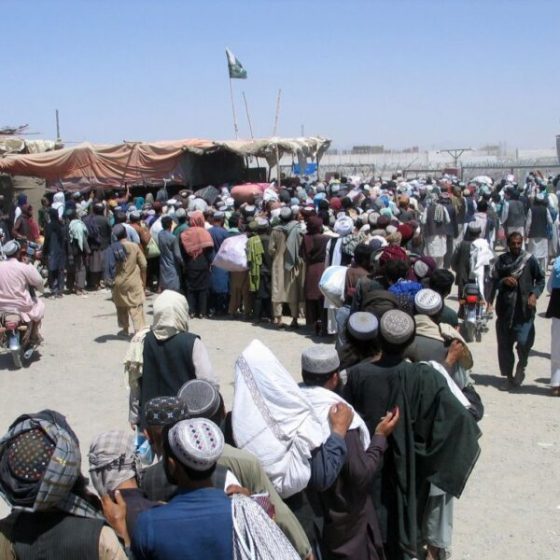
Concerning the Biden administration and its unctuous professions of transatlantic unity, the European governments must be questioning … with buddies like that who needs opponents?
President Joe Biden vowed “America is back” when he took workplace, meaning that Washington would straighten with and regard European allies under its global leadership after the years of Trump discord.
The European political establishment swooned and cooed like dutiful debutantes apparently having Uncle Sam’s affections and patronage again.
How quickly certainly has that allegedly rosy relation in between the U.S. and the Europeans been ruptured with bitter recriminations following the devastating collapse in Afghanistan. The EU is rushing to deal with the possible fallout of mass migration from the Main Asian nation after the go back to power of the Taliban.
This is the militant group that Washington and its NATO allies spent 20 years fighting at the cost of numerous thousands of lives and trillions of dollars– only for the militants to seize power amidst a total collapse of a U.S.-backed program in Kabul.
Yeah, America is back alright. Causing chaos and political headaches for its supposed European partners.
The U.S.-led military interventions in Afghanistan, Iraq, Libya and Syria have actually already shaken the European Union to the core with political crisis from the destabilizing influx of migrants from battle zone. That crisis came to a head in 2015-2016 when an estimated one million refugees made their method into EU member states. Then German Chancellor Angela Merkel reacted with an open-door policy of accepting asylum hunters. However that policy rebounded in explosive tensions within and between member states owing to European nations perceiving an overwhelming obstacle to their social systems.
That, in turn, caused EU states closing their borders in offense of the whole idea of a seamless bloc. There was likewise much open bickering between member nations accusing each other of not sharing the problem of accommodating foreign migrants.
The crisis also fed into the increase of anti-EU populism since the Brussels bureaucracy was perceived as overriding national authorization about accepting the increase of non-Europeans.
Let’s recapitulate: much of the stress from the migration pressure on the EU stemmed from Washington’s prohibited wars in Asia, the Middle East and North Africa. Wars, undoubtedly, that the European NATO allies assisted in prosecuting.
Having stated that, however, it was the small American partners who seemed to be packed disproportionately with the consequences in terms of dealing with the migration from the war zones– not the United States.
The same baleful phenomenon looks like duplicating. Today European Union foreign ministers held an emergency situation summit to assess the aftermath of the Afghanistan debacle.
“We need to ensure that the new political situation produced in Afghanistan by the return of the Taliban does not result in a massive migratory movement towards Europe,” stated Josep Borrell, the EU’s diplomacy chief.
German foreign minister Heiko Maas said the EU is concerned about “the stability of the area”, adding that “neighboring countries will certainly be challenged with more refugee movements.”
As the Washington Post reported:”[ European Union] officials used rare criticism of Washington for risking a flood of refugees to their borders and the return of a platform for terrorism in Central Asia.”
It is estimated that nearly 570,000 Afghan nationals have actually applied to the European Union for political asylum over the past six years. Even before the remarkable taking of power recently by the Taliban, there was a sharp increase in Afghans leaving to the EU.
The European federal governments are caught in a public relations headache. Earlier this month, six EU member states– Austria, Belgium, Germany, Denmark, Netherlands and Greece– were promoting the “forced return” of Afghans who had actually been declined asylum. Now, that effort is being suspended since of the politically harmful appearance of EU states callously sending out people back to the Taliban routine, which doesn’t exactly share “European worths” (whatever that indicates).
Meanwhile, Germany’s Merkel made a veiled swipe at the Biden administration stating she thought the U.S. choice to press ahead with the withdrawal was taken for “domestic political factors” and was to blame for the occurring chaos in Afghanistan. The leader of her celebration, Armin Laschet, went further, calling the whole Afghanistan operation a failure and the withdrawal “the greatest debacle that NATO has actually suffered since its starting” 72 years earlier.
Austria and other EU members are striving to establish deportation centers in Pakistan, Turkey, Uzbekistan and Tajikistan to keep the refugees at bay. However it is far from specific that such a scheme would work.
Because case, the European Union is set to incur another massive migration wave from Afghanistan. With a population of 38 million and an approximated five million internally displaced, the numbers of Afghans seeking to make their method throughout EU borders might exceed the waves of refugees formerly seen from Syria, Iraq, and Libya as well as Afghanistan during the previous six years.
The Biden administration is being criticized by other NATO members for hastily pulling out of Afghanistan therefore setting off the implosion of an already unsteady puppet program in Kabul.
America’s European allies are in particular facing enormous political pressure over the resultant humanitarian crisis and the inescapable flow of refugees demanding a safe house. This will shake the EU to the core again and with that the transatlantic alliance.
Concerning the Biden administration and its unctuous professions of transatlantic unity, the European governments must be questioning … with good friends like that who requires opponents?

